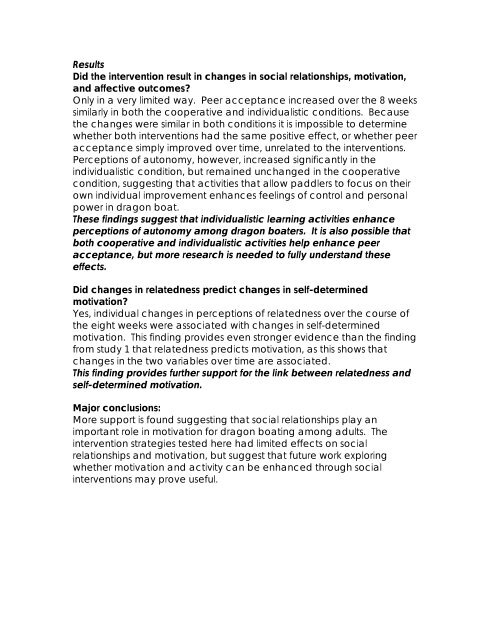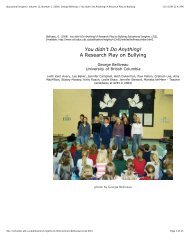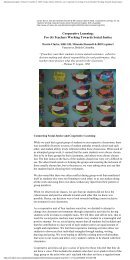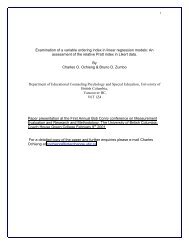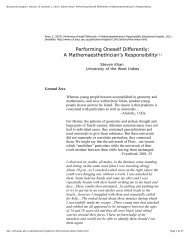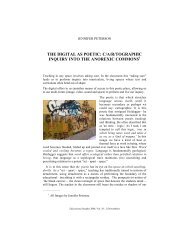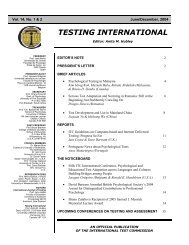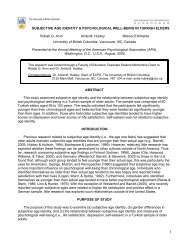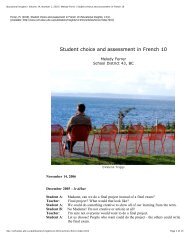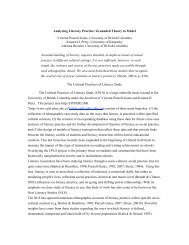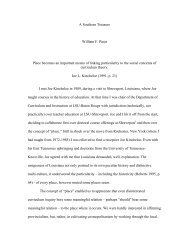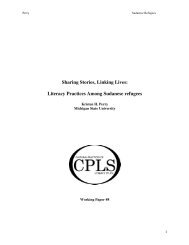The Role of Relatedness in Physical Activity Motivation, Behaviour ...
The Role of Relatedness in Physical Activity Motivation, Behaviour ...
The Role of Relatedness in Physical Activity Motivation, Behaviour ...
Create successful ePaper yourself
Turn your PDF publications into a flip-book with our unique Google optimized e-Paper software.
Results<br />
Did the <strong>in</strong>tervention result <strong>in</strong> changes <strong>in</strong> social relationships, motivation,<br />
and affective outcomes?<br />
Only <strong>in</strong> a very limited way. Peer acceptance <strong>in</strong>creased over the 8 weeks<br />
similarly <strong>in</strong> both the cooperative and <strong>in</strong>dividualistic conditions. Because<br />
the changes were similar <strong>in</strong> both conditions it is impossible to determ<strong>in</strong>e<br />
whether both <strong>in</strong>terventions had the same positive effect, or whether peer<br />
acceptance simply improved over time, unrelated to the <strong>in</strong>terventions.<br />
Perceptions <strong>of</strong> autonomy, however, <strong>in</strong>creased significantly <strong>in</strong> the<br />
<strong>in</strong>dividualistic condition, but rema<strong>in</strong>ed unchanged <strong>in</strong> the cooperative<br />
condition, suggest<strong>in</strong>g that activities that allow paddlers to focus on their<br />
own <strong>in</strong>dividual improvement enhances feel<strong>in</strong>gs <strong>of</strong> control and personal<br />
power <strong>in</strong> dragon boat.<br />
<strong>The</strong>se f<strong>in</strong>d<strong>in</strong>gs suggest that <strong>in</strong>dividualistic learn<strong>in</strong>g activities enhance<br />
perceptions <strong>of</strong> autonomy among dragon boaters. It is also possible that<br />
both cooperative and <strong>in</strong>dividualistic activities help enhance peer<br />
acceptance, but more research is needed to fully understand these<br />
effects.<br />
Did changes <strong>in</strong> relatedness predict changes <strong>in</strong> self-determ<strong>in</strong>ed<br />
motivation?<br />
Yes, <strong>in</strong>dividual changes <strong>in</strong> perceptions <strong>of</strong> relatedness over the course <strong>of</strong><br />
the eight weeks were associated with changes <strong>in</strong> self-determ<strong>in</strong>ed<br />
motivation. This f<strong>in</strong>d<strong>in</strong>g provides even stronger evidence than the f<strong>in</strong>d<strong>in</strong>g<br />
from study 1 that relatedness predicts motivation, as this shows that<br />
changes <strong>in</strong> the two variables over time are associated.<br />
This f<strong>in</strong>d<strong>in</strong>g provides further support for the l<strong>in</strong>k between relatedness and<br />
self-determ<strong>in</strong>ed motivation.<br />
Major conclusions:<br />
More support is found suggest<strong>in</strong>g that social relationships play an<br />
important role <strong>in</strong> motivation for dragon boat<strong>in</strong>g among adults. <strong>The</strong><br />
<strong>in</strong>tervention strategies tested here had limited effects on social<br />
relationships and motivation, but suggest that future work explor<strong>in</strong>g<br />
whether motivation and activity can be enhanced through social<br />
<strong>in</strong>terventions may prove useful.


